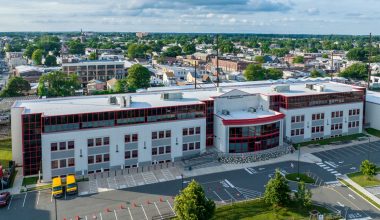What is higher education? This question bugs the minds of those who are on the verge of choosing a career path for themselves and oftentimes, they are quite confused about whether it really is as important as it looks.
It is a crucial phase in a person’s academic and personal development, extending beyond the realms of primary and secondary education.
This article will delve into the meaning, purpose, and objectives of higher education, shedding light on its profound impact on individuals and society.
Kindly read through it!
Table of contents
What’s Higher Education?
Higher education, often referred to as tertiary education, encompasses post-secondary learning opportunities provided by colleges, universities, vocational institutions, and professional schools.
It goes beyond the basic knowledge imparted in primary and secondary education and offers specialized knowledge, skills, and critical thinking abilities in various academic disciplines and professional fields.
One defining characteristic of higher education is its emphasis on research, critical analysis, and pursuing advanced knowledge. It encourages students to engage in intellectual exploration, fostering an environment where creativity, innovation, and independent thinking are valued.
What is the Purpose of Higher Education?
The purpose of higher education is multifaceted and can vary from individual to individual. However, several overarching goals define its fundamental role in society:
- Acquisition of Specialized Knowledge: Provides students with in-depth knowledge and expertise in their chosen fields of study. Whether it’s engineering, medicine, humanities, or social sciences, students gain a deeper understanding of their subjects, preparing them for careers and lifelong learning.
- Development of Critical Thinking: Fosters critical thinking skills by encouraging students to question assumptions, analyze complex issues, and solve problems.
- Personal Growth and Development: Beyond academics, it supports personal growth. It promotes self-discovery, independence, and maturity, helping students become well-rounded individuals capable of navigating life’s challenges.
- Preparation for the Workforce: Equips students with the skills and qualifications needed to enter various professions. It bridges the gap between theory and practice, enabling graduates to contribute effectively to their chosen fields.
- Research and Innovation: Plays a vital role in advancing human knowledge. These institutions are hubs of research and innovation, driving progress in science, technology, and various academic disciplines.
Objectives of Higher Education
The objectives of higher education encompass a wide range of goals that aim to fulfill various roles in the personal, academic, and societal development of individuals. These objectives include:
Quality Education
Higher education ensures the delivery of high-quality education that meets international standards and equips graduates with the knowledge and skills they need to excel in their chosen fields.
Development of Critical Thinking
It fosters critical thinking skills by encouraging students to question assumptions, analyze complex issues, and develop problem-solving abilities. These skills are essential for making informed decisions and adapting to an ever-changing world.
Research and Innovation
Universities and research institutions play a vital role in advancing human knowledge. These institutions are the hubs of research and innovation, driving progress in science, technology, and various academic disciplines.
Personal Growth and Development
Beyond academics, it supports personal growth. It promotes self-discovery, independence, and maturity, helping students become well-rounded individuals capable of navigating life’s challenges.
Cultural and Societal Enrichment
It contributes to cultural diversity and societal enrichment by exposing students to a wide range of ideas, perspectives, and experiences. This diversity enhances understanding and promotes tolerance.
Leadership and Ethical Values
Higher education instills leadership qualities and ethical values in students, emphasizing the importance of integrity, social responsibility, and ethical decision-making.
Read: Student Food Budget: How Much Do Students Spend on Food?
What are the Prerequisites to Getting into Higher Education?
Getting into higher education typically involves meeting certain prerequisites and requirements, which can vary depending on the country, institution, and specific program of study. Here are some common prerequisites and steps to consider:
- Completion of Secondary Education: Most institutions require a high school diploma or its equivalent as a basic prerequisite. In some countries, this may involve completing secondary education up to a certain grade level or passing specific standardized exams.
- Academic Performance: Your academic performance in secondary school can significantly impact your eligibility for furthering your studies.
- Standardized Tests: Many universities and colleges require applicants to take standardized tests such as the SAT, GRE, TOEFL, IELTS.
- Letters of Recommendation: Many universities and colleges ask for letters of recommendation from teachers, counselors, or professionals who can vouch for your character, work ethic, and potential as a student.
- Personal Statement or Essay: Applicants often need to submit a personal statement or essay explaining their goals, interests, and why they want to pursue higher education in a particular field.
Types of Higher Education Institutions
Higher education institutions come in various types and formats, each with its own unique characteristics and educational offerings. Here are some of the common higher education institutions:
Universities
Universities are comprehensive institutions that offer undergraduate and graduate degree programs across a wide range of academic disciplines. They often emphasize research and may include multiple colleges or schools within the university, such as colleges of arts and sciences, business, engineering, and more.
Colleges
Colleges typically focus on undergraduate education and may offer bachelor’s degree programs. They can vary in size and specialization, with some being liberal arts colleges that emphasize a broad-based education and others offering specific vocational or professional programs.
Community College
Community colleges, also known as junior colleges or two-year colleges, provide two-year associate degree programs and vocational and technical training.
They often serve as a more affordable and accessible entry point into higher education, allowing students to complete general education requirements before transferring to a four-year institution.
Technical and Vocational Schools
These institutions specialize in providing hands-on training and education in specific trades or professions. They offer certificates, diplomas, and associate degrees in areas such as automotive technology, culinary arts, healthcare, and more.
Online Universities and Colleges
Online higher education institutions offer degree programs that can be completed entirely online. They provide flexibility for students who may have work or family commitments and cannot attend traditional on-campus classes.
See this: When Should You Start Revising For Your A-Levels Exam?
Quality Assurance in Higher Education
Quality assurance in higher education is a critical process that ensures that institutions of higher learning maintain high academic standards, provide quality education, and continuously improve their programs and services.
It encompasses a range of activities and mechanisms aimed at evaluating, monitoring, and enhancing the quality of education and research within universities and colleges.
Here are key aspects of quality assurance in higher education:
- Accreditation
- Quality Standards
- Student Assessment
- Global Recognition
- Benchmarking
Higher Education Funding
Funding for higher education is a critical component of ensuring that students have access to quality educational opportunities and that institutions can maintain high academic standards. Funding for higher education can come from various sources, including government funding, tuition and fees, private donations, and research grants.
Here are some key aspects of higher education funding:
- Government Funding
- Tuition and Fees
- Endowments and Donations
- Tuition Assistance Programs
- Student Loans
- Grants and Scholarships
FAQs
Benefits include increased earning potential, expanded career opportunities, and personal growth.
While not mandatory for all fields, higher education can enhance career prospects and qualifications in many professions.
Accreditation ensures that institutions and programs meet established quality standards and are recognized for their credibility.
Conclusion
It is a transformative experience with profound implications for individuals and society. Its meaning, purpose, and objectives revolve around knowledge acquisition, critical thinking, personal growth, workforce preparation, and societal betterment.
By striving for these objectives, higher education institutions play a vital role in shaping the future and driving progress in an ever-evolving world.




